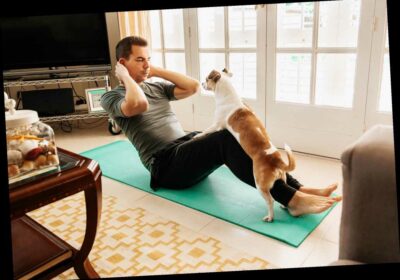These Expert Tips Will Help You Easily Make Your Pet Part of Your Wellness Routine in 2021

Regardless of whether they made New Year's resolutions or not, pet owners' have a built-in buddy to help them achieve their wellness goals in 2021.
Erin DeAngelis, a category manager with Pet Supplies Plus, has expert advice on how to unlock the potential in your pet and yourself, so you both have a healthier year. DeAngelis designed these tips with new pet owners in mind since so many animal lovers adopted their first pet during the ongoing coronavirus pandemic.
Read on to discover DeAngelis' easy tips for making your pet part of your 2021 wellness routine, so everyone in your household can be happier and healthier.
Get them into a Routine: We are fresh off a year that threw most people for a loop and upended routine schedules, so it's important to commit to getting back into the groove. The same goes for your pets. In fact, studies have shown that pets – in addition to their owners – experienced weight gain over the last 12 months. Regular walks, time for more intense exercise or play, and mealtime should all happen around the same time each day. It will not only help you and your pet be healthier, but chances are, it's going to help prevent them from acting out due to either boredom or a chaotic schedule. The important thing here is to make sure that the routine works for you so that it becomes not just a habit, but an effortless lifestyle.
Get Your Pet Moving: If you haven't worked out in a while, your endurance will not be what it used to be. The same goes for your pet, which is why it's critical to ease them into any sort of exercise routine to prevent injury. Anywhere from 30 minutes to 2 hours of exercise works for a dog, depending on age, endurance, and breed. Running, walking, and sprinting via fetch are great places to start. As always, keep an eye on your pup's behavior and mood, so you can see if it's time to crank up the energy or take a break. And, always make sure plenty of water is supplied – especially when you're on the go.
Nutrition Is Key: Were you a little more lenient with your pet's diet during the height of the pandemic and the holidays? You're not alone! However, now is a great time to reevaluate their food intake – including treats – and determine whether you need to pull back, switch up, or eliminate certain foods. When it comes to switching up your pet's main food, gradually incorporating a new brand will help your pet adjust easier. And, treats make great rewards for good behavior, so feel free to still provide some treats while being mindful of how many. There are also healthier treats available that help keep your pet's diet balanced.
Keep them Engaged: Whether we're stuck indoors due to COVID-19 mandates or the cold weather, consider investing in toys that will help exercise your pet's mind. This strengthens the brain and helps combat boredom and naughty behavior. Puzzles and treat dispenser toys are great for when you're away or busy working, but if you're home, your pet will relish in quality time spent playing – creating a scavenger hunt or a safe game of chase are nice options.
Get Comfortable with Grooming: Grooming does more than just keep your dog or cat smelling fresh, it's a great opportunity for early detection of any skin or health issues. I almost always recommend getting your pet professionally groomed, because when you link up with a groomer that you trust, they can help inform you of anything that needs to be looked into (weight changes, growths, issues with the skin, nails or teeth, etc.) Routine grooming reduces matting that can be painful to remove down the line and can also help owners control dander and shedding – two allergy triggers. Between grooming sessions, get your pet used to being combed and/or brushed.
Schedule Regular Checkups: For an easy reminder, schedule your pet's wellness visits around your own. And, once you find a veterinarian that works for your family, stick with them. In your vet's chart, your pet's weight, blood work, nutrition, and more are tracked. Throughout the years, your vet – similar to an owner's primary care physician – will come to know and understand your pet's personality, making it easier for them to be able to detect if something is off.
Source: Read Full Article
